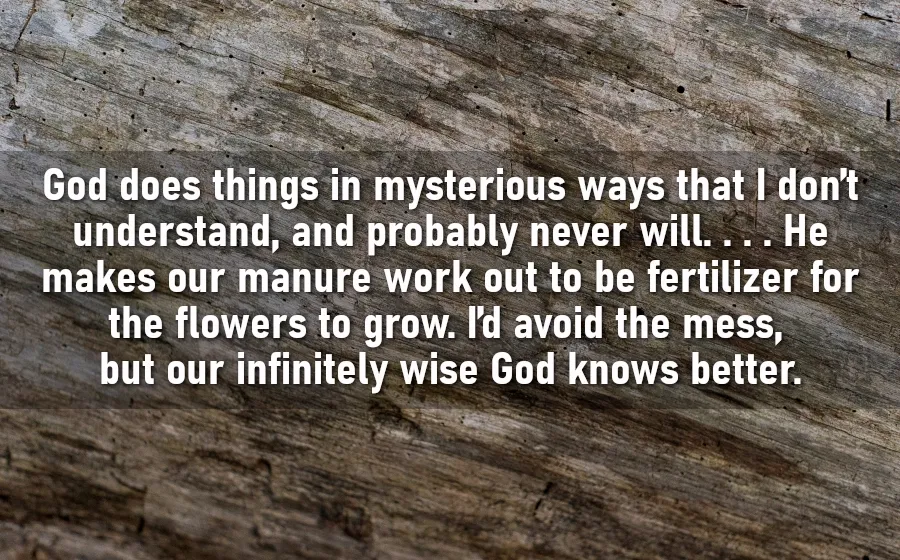The Glory of God: Lessons from Lazarus’ Resurrection
Image

“Jesus said, ‘Remove the stone.” Martha, the sister of the deceased, said to Him, “Lord, by this time he smells, for he has been dead four days.’ Jesus said to her, ‘Did I not say to you that if you believe, you will see the glory of God?’” (John 11:39–40, LSB)
Mary and her sister Martha must have sat together, grieving in their home as they waited for Jesus. Why was He delayed? They knew He loved them and had informed Him of Lazarus’s sickness in time for Jesus to rush in and heal their brother. What happened?
The fact that both sisters told Jesus the same thing, almost verbatim, leads me to believe they had discussed this very truth: if Jesus had been there, Lazarus would not have died (see John 11:21, 32). In fact, it seems the gathered mourners may have overheard their conversation and reached the same conclusion, but they used it as proof that Jesus was a sham (John 11:37) or not powerful enough to prevent Lazarus’ sickness from leading to death.
However, instead of stopping the sickness, Jesus allowed the illness to take His friend’s life. Not only did Jesus wait long enough for the disease to do its damage, but he also missed the funeral and burial. Lazarus had been dead for four days, and in the Middle East, decomposition of bodies begins quickly.
The question of whether Jesus could heal a sick friend was settled in the minds of Mary and Martha but remained uncertain for the watching crowd. However, Jesus didn’t want to just heal a sick man; He aimed to demonstrate that His power surpassed that of an ordinary doctor. The crowd was intrigued by a man who could supposedly heal the blind (a more complicated healing) but seemed unable to heal a sick man (a simpler task typically handled by doctors and basic medical remedies).
Christ saw and knew all of this. If He healed Lazarus, people would likely dismiss the healing. If He raised him immediately from the dead, some might argue that Lazarus hadn’t truly died. However, after four days in the tomb and being already decomposed, there could be no doubt that this was a case beyond the ability of anyone but God. A miracle was necessary.
I enjoy watches and clocks, especially the beautiful mechanical clockworks that demonstrate precision and craftsmanship. I have a few clocks on which I have performed some minor repairs, creating the wonderful “tick-tock” sound in my study that I enjoy. I’m not sure if there will be clocks in the eternal state, but I do know that God won’t be constrained by them as we are now. God’s timing doesn’t align with ours.
Mary and Martha wanted Jesus to stop death. The crowd doubted He could do it. Jesus delayed. All of these aspects often puzzle us because we tend to believe that God wants things to happen our way and in our time. But in this account, Jesus shattered that notion.
God does things in mysterious ways that I don’t understand, and probably never will. He lets disaster happen and then causes the circumstances to work out perfectly. He makes our manure work out to be fertilizer for the flowers to grow. I’d avoid the mess, but our infinitely wise God knows better.
But even more important than how everything turns out for you and me is what it teaches us about God. In verse 40, Jesus pulls back the curtain and shows us why everything needed to happen this way. He said, “Did I not say to you that if you believe, you will see the glory of God?” Why wait and let Lazarus die, causing such grief for these two sisters He loved? Why wait and endure all the suffering and expense of a funeral? Because God wanted to teach His children something. The lesson? “If you believe, you will see the glory of God.”
I don’t think Jesus was speaking only about the glory He would receive in that moment from bringing Lazarus back to life. I believe He was referring to the greater glory when He speaks and the dead in Christ will rise, bringing about the resurrection of all the dead (Jn 5:25-32). The brief glimpse of what He did before all those people that day was merely a sample of what is to come. On that day, all who believe will witness the glory of God in a way this world has never seen.
So, dear reader, what are you facing today? Be careful not to grumble and complain against God for leading you through it. I know you might believe you had a better plan for your day, but trust me, you don’t. God has a perfect purpose for why you are experiencing whatever you are going through. Trust Him; He knows what He’s doing.
Richard Bargas Bio
Richard Bargas (BA, Biola Univ.; MDiv, DMin, The Master's Seminary) is the Executive Director of IFCA International and the Editor of the VOICE magazine. He blogs at Always Reforming.
- 19 views


Discussion